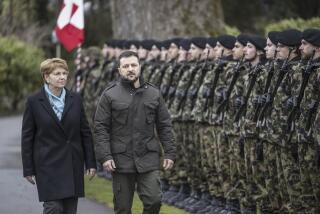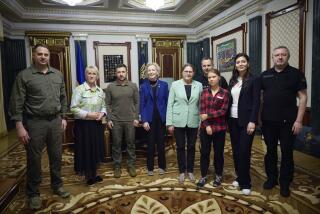Russia a Reluctant Guide to OSCE Chief
- Share via
BOTLIKH, Russia — As Russia’s war against Chechnya continued Tuesday, with reports of skirmishes on the outskirts of the capital, Grozny, the chairman of the Organization for Security and Cooperation in Europe spent the day in the neighboring Russian republic of Dagestan.
In what is shaping up as a tightly controlled visit, Russia scheduled the main part of Knut Vollebaek’s itinerary on a trip to investigate the war not in Chechnya but in Dagestan. The OSCE chief will spend no more than a few hours today in Chechnya, and that in the northern, Russian-controlled sector.
The United States and Europe have been critical of the high civilian casualties in the current war, and representatives of the 56-nation OSCE are trying to end the violence and move the parties toward peace talks. But Russia has been resistant to the OSCE mission since it was proposed, and the limitations imposed on Vollebaek’s trip suggest that Moscow still has a long way to go before it is willing to sit down and negotiate.
The emphasis on Dagestan in the OSCE schedule was clearly Russia’s way of underscoring the genesis of the present war in last summer’s incursion into Dagestan by Chechen rebels--and the Russian view that tough military actions are not out of proportion to the threat the rebels pose. After the guerrilla retreat from Dagestan into Chechnya, the Russians launched repeated bombing attacks on Chechen villages and in early October began a ground attack.
The clear message that the Russians delivered with the tour itinerary and choice of stops: Send humanitarian aid if you like, there is no political role for you here.
Villages in the arid highlands of Dagestan, the poorest of Russia’s republics, have plenty to complain about. Several are still getting over the shock of the invasion by the Chechen militants, who were not driven out by the Russian military until more than a month later. Anti-Chechen sentiment is high in this area. Vollebaek visited one village Tuesday, Tando, in the Botlikh region close to the Chechen border, that was nearly razed by Russian bombers in their drive to oust the Chechens.
Still, Vollebaek struck a conciliatory note after meeting with the leader of Dagestan, Magomedali Magomedov, and Russian Deputy Foreign Minister Alexander Avdeyev.
“We know that civilians are suffering in Chechnya, and I think it’s important that both sides--the rebels from Chechnya but also the Russian forces--take into consideration that they are fighting with civilian lives at stake,” he said.
The situation in Chechnya is particularly critical in Grozny, where tens of thousands of civilians are believed to be still trapped. Russia dropped leaflets onto the capital last week urging people to leave the city and warning that they would otherwise be considered terrorists and destroyed--a message that provoked international condemnation.
Vollebaek has criticized the Russians for opening only limited escape corridors from Grozny for six hours a day, and this week he called for a cease-fire so that civilians could leave.
“I’ve made an appeal for a cease-fire, and if there is an attack on Grozny, I have not been answered. To the contrary, they are doing just the opposite of what I have requested,” he said.
The Russian plan for Vollebaek calls for a brief visit today to Gudermes, Chechnya’s second-largest city, which was surrendered by the Chechens some weeks ago with little fighting. Late Tuesday, however, the OSCE team was still trying to negotiate the schedule. They won one concession when the Russians agreed to let them inspect one of the two escape routes out of Grozny to assess whether people can get out of the city.
Russian officials at first strongly resisted and then delayed the OSCE mission, apparently at pains to ensure that it would come too late to have any impact on Russian parliamentary elections this weekend.
The Russian side also dragged its feet on logistics, insisting that the OSCE rent helicopters and hence providing only limited space for reporters accompanying the delegation--though the Russians frequently fly local and foreign journalists to northern Chechnya by helicopter.
The real difficulty for the OSCE in carving itself a role in the region is Russia’s domestic political situation, with top government officials closely associated with the war.
Prime Minister Vladimir V. Putin, the front-running presidential candidate, launched the war, and his popularity has risen sharply as a result.
Because of this, the presidential election scheduled for next summer is likely to hamper progress toward a settlement, OSCE officials fear.
“My message was that we have to try to find a process for possible dialogue so that the population of Chechnya can feel included in this dialogue,” Vollebaek said after Tuesday’s meetings. “We have to start a political process. That’s the only way we can have a lasting solution.”
He said it was encouraging that Russia had agreed to allow the OSCE to enter Chechnya after offering initial resistance.
The OSCE chairman held his plane up in Makhachkala, the Dagestani capital, Tuesday evening to allow Russia’s emergency situations minister, Sergei K. Shoigu, to join him on a flight to the Russian republic of Ingushetia, which also borders Chechnya. Shoigu is leader of the Unity Party associated with the Kremlin, rated by many pollsters in second place in public support after the Communists.
Despite heavy fog at its destination airport, the plane took off with Shoigu and Vollebaek on board as Russian television cameras rolled, but after half an hour of circling Makhachkala the plane landed again.
The OSCE chairman is expected to visit Ingushetia today before flying to Vienna to deliver a report to the OSCE.
More to Read
Sign up for Essential California
The most important California stories and recommendations in your inbox every morning.
You may occasionally receive promotional content from the Los Angeles Times.













